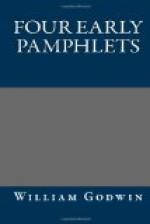We were very apprehensive upon Mr. Burke’s coming into administration, that this circumstance might have proved a bar to any further additions to the valuable collection of his speeches already in the hands of the public. If we imagined that our verdict could make any addition to the very great and deserved reputation in which they are held, we should not scruple to say that were Cicero our contemporary, and Mr. Burke the ancient, we are persuaded that there would not be a second opinion upon the comparative merits of their orations. In the same degree as the principles of the latter are unquestionably more unsullied, and his spirit more independent; do we esteem him to excel in originality of genius, and sublimity of conception.
We will give two extracts; one animadverting upon the preliminaries of peace concluded by the earl of Shelburne; the other a character of David Hartley, Esq.
“I know that it has been given out, that by the ability and industry of their predecessors we found peace and order established to our hands; and that the present ministers had nothing to inherit, but emolument and indolence, otium cum dignitate. Sir, I will inform you what kind of peace and leisure the late ministers had provided. They were indeed assiduous in their devotion; they erected a temple to the goddess of peace. But it was so hasty and incorrect a structure, the foundation was so imperfect, the materials so gross and unwrought, and the parts so disjointed, that it would have been much easier to have raised an entire edifice from the ground, than to have reduced the injudicious sketch that was made to any regularity of form. Where you looked for a shrine, you found only a vestibule; instead of the chapel of the goddess, there was a wide and dreary lobby; and neither altar nor treasury were to be found. There was neither greatness of design, nor accuracy of finishing. The walls were full of gaps and flaws, the winds whistled through the spacious halls, and the whole building tottered over our heads.
Mr. Hartley, sir, is a character, that must do honour to his country and to human nature. With a strong and independent judgment, with a capacious and unbounded benevolence, he devoted himself from earliest youth for his brethren and fellow creatures. He has united a character highly simple and inartificial, with the wisdom of a true politician. Not by the mean subterfuges of a professed negociator; not by the dark, fathomless cunning of a mere statesman; but by an extensive knowledge of the interest and character of nations; by an undisguised constancy in what is fit and reasonable; by a clear and vigorous spirit that disdains imposition. He has met the accommodating ingenuity of France; he has met the haughty inflexibility of Spain upon their own ground, and has completely routed them. He loosened them from all their holdings and reserves; he left them not a hole, nor a corner to shelter themselves. He has taught the world a lesson we had long wanted, that simple and unaided virtue is more than a match for the unbending armour of pride, and the exhaustless evolutions of political artifice.”




